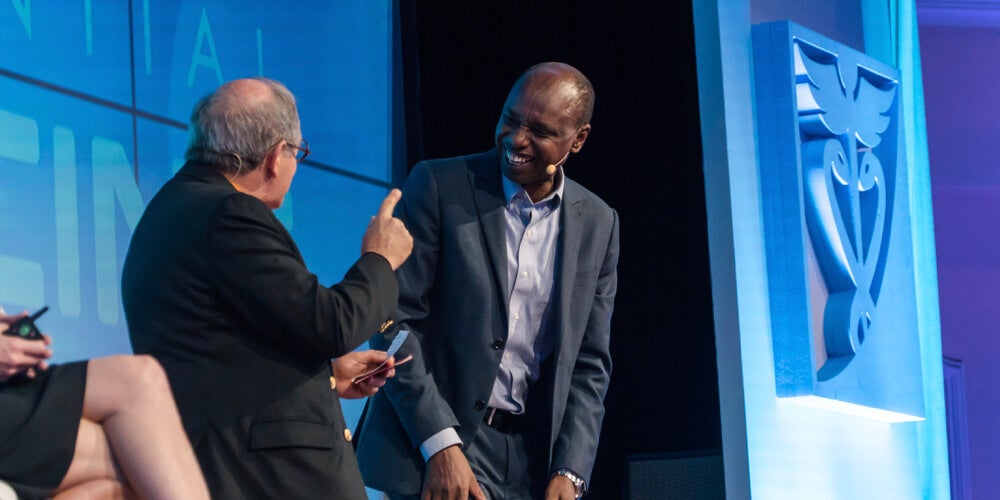5 Billion People Need Better Healthcare — Technology Will Help Deliver It

Share
If you’ve ever had to go into the hospital for a major medical procedure, your memory of the experience is probably pretty unpleasant. Even when all goes well, the hospital is a nerve-racking place most of us would rather not be.
But did you know that just by being treated in a functioning hospital and having access to modern care, you’re part of a dramatic global minority? The Lancet Commission on Global Surgery’s 2015 report stated that five billion people lack access to safe, affordable surgical care.
In a presentation at Singularity University’s Exponential Medicine conference this week, entrepreneur Deogratias “Deo” Niyizonkiza shared his inspiring life story with the audience, using his native Burundi as a microcosm of the healthcare challenges facing developing nations around the world.
Niyizonkiza was a medical student when Burundi’s ethnic genocide erupted in 1993. After surviving a massacre at the hospital where he was studying, he fled to New York. There he overcame obstacles like illness, homelessness, and poverty, going on to receive an Ivy League education in biochemistry and public health.
Upon returning to Burundi he was devastated by the hunger, disease, and despair he saw. He knew he had to stay and try to make a difference. He founded Village Health Works, a grassroots nonprofit that now operates Burundi’s premier health center as well as agricultural and environmental programs, educational services, women’s income-generating activities, and other community development programs. Niyizonkiza’s story is told in the New York Times bestseller Strength in What Remains.
It’s not just hospitals that are missing
Burundi is ranked 184 out of 188 countries on the United Nations Human Development Index. Current life expectancy and maternal mortality rates there are similar to US rates from 100 years ago, with one in 23 women dying in childbirth.
After the 1993 genocide, the country went through 13 years of civil war.
Establishing sources of quality healthcare in countries like Burundi is a lot more complicated than building a hospital and hiring doctors. But Niyizonkiza’s questions upon considering these challenges were:
If technology can democratize healthcare, why not start with one of the most challenging cases?
Can a hospital in Burundi serve as a platform to show the world that innovation and technology can exponentially improve the wellness of the global majority?
Niyizonkiza summarized the barriers to delivering healthcare in developing nations as the Four S’s:
Be Part of the Future
Sign up to receive top stories about groundbreaking technologies and visionary thinkers from SingularityHub.


- Space: There are not nearly enough district-level hospitals, and the ones that exist are crippled by a lack of infrastructure. There’s not much good in having a hospital if the dirt road to get to it becomes unusable during the nine-month-long rainy season.
- Stuff: The supply chain for medicine and medical supplies is consistently complicated. Barriers like customs, hidden costs, national bureaucracy, and shipping make it difficult for a hospital to be well-equipped. This friction needs to be smoothed over.
- Staff: The clinical work force is incredibly sparse in most developing nations. The ratio of doctors to patients is strikingly low. They need help getting skills and expertise to the right place at the right time.
- Systems: Communication systems are lacking as much as infrastructure is. There’s no consistency of electricity or running water, and no reliable telecommunications system.

Ralph Simon and Deogratias Niyizonkiza at Exponential Medicine.
How technology can democratize care
Given the scale of these challenges, linear solutions aren’t going to cut it; we need exponential solutions that will transcend the existing barriers, and they need to do so in years, not decades. Below are a few examples of recent advances in health technology that can be applied in the developing world.
- Mobile health support: Project Masiluleke is addressing the HIV/AIDS crisis in South Africa using simple mobile phone technology. It connects cell phone users to existing HIV and TB call centers, reminds patients of scheduled clinic visits, and is developing a breakthrough distributed diagnostics model for low-cost HIV self-testing with counseling support via mobile phone.
- Drone delivery of medicine: Matternet is demonstrating how automated drones can deliver medicine to where it’s needed most in regions that lack roads or have seasonal road infrastructure issues.
- Remote robotic surgery: Intuitive Surgical’s da Vinci Surgical System is leading the progress in robotic-assisted minimally invasive surgery. Robotic surgery enhances surgeons’ abilities by putting a digital layer between patient tissue and the surgeon’s eyes, making motions more precise and transmitting surgical incisions over a distance. Currently, those distances are relatively short, but with the right technology, a surgeon based in Chicago could one day use a surgical robot to remotely operate on patients in Burundi without leaving his home hospital.
- Advanced diagnostics without the lab: Samuel Sia’s mChip uses a microfluidic optical chip to diagnose infectious diseases like HIV and syphilis in minutes. The microchip inside the device is formed through injection molding and holds miniature forms of test tubes and chemicals; the cost of the chip is about $1 and the entire instrument about $100. The chip was successfully field tested in Rwanda. Precision medicine startup Miroculus is building a 3D-printed device that uses digital microfluidics to diagnose early stage gastric cancer. Nanobiosym developed a Lab-on-a-Chip array that detects the DNA and RNA signature of any pathogen in your system then reports it to a central supercomputer.
- The power of information: Google X's Project Loon wasn’t designed with healthcare access as a primary goal, but imagine the impact that reliable internet connectivity will have on health in the developing world: millions of people will gain access to health-related information, communication, and resources previously unavailable to them.
- Mental health by AI: Startup X2AI built a mental healthcare AI named Tess. Tess provides mental health services like psychotherapy and cognitive behavioral therapy, and can be accessed through existing channels like SMS, Facebook messenger, and many internet browsers. The company recently demoed their technology in a Syrian refugee camp.
These innovations and others like them are a great start, but we’ve got a long way to go before accessible, high-quality healthcare becomes a worldwide reality. Near the end of his presentation Niyizonkiza stressed the importance of continuing to invest in and develop healthcare-focused exponential technologies.
His concluding words? “Five billion human beings are waiting.”
Want to keep up with coverage from Exponential Medicine? Get the latest insights here.
Image Credit: Shutterstock
Vanessa has been writing about science and technology for eight years and was senior editor at SingularityHub. She's interested in biotechnology and genetic engineering, the nitty-gritty of the renewable energy transition, the roles technology and science play in geopolitics and international development, and countless other topics.
Related Articles

How Will the Universe End? The Dark Eternity That Awaits Us Trillions of Years From Now

Data Centers in Space: Will 2027 Really Be the Year AI Goes to Orbit?

How Scientists Are Growing Computers From Human Brain Cells—and Why They Want to Keep Doing It
What we’re reading